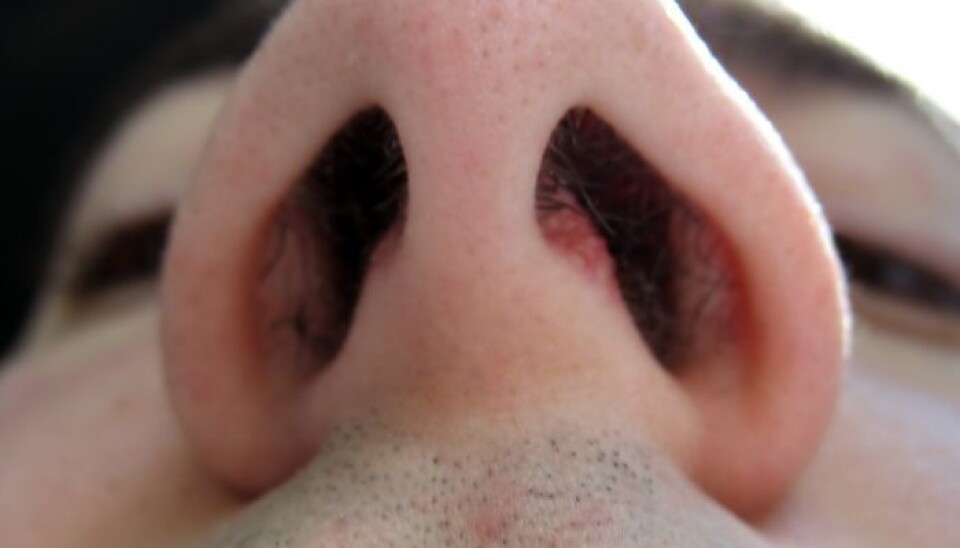
How do we train our sense of smell?
You can boost your olfactory powers − but your nose won’t be changing.
Denne artikkelen er over ti år gammel og kan inneholde utdatert informasjon.
In a lovely flower garden you might wish you had stronger senses. But it could also be an advantage to dull them when a friend is changing her toddler’s soiled diapers on your living room floor.
The strength of our five senses varies from person to person, and research shows we can actually train them in the same way we hone other skills.
Does that mean we can exercise our way to super senses?
Researchers have the answer. But first, we start with:

What actually happens in our body when we train our sense of smell?
Our noses aren’t the prominent element when we train our sense of smell, according to Professor Clive Bramham, of Department of Biomedicine at the University of Bergen.
“The most important changes occur in the brain,” he says.
The brain is equipped with more than a hundred million nerve cells. Their main job is to transmit signals, such as sensory perceptions.
Bramham says the nerve cells in the brain change size and shape if we exercise our senses. We can also develop more nerve cells.
In addition, the communicative capabilities of the cells get enhanced when we train our senses.
Nerve cells communicate via synapses, which can get stronger or weaker, meaning our ability to sense sensory messages between nerve cells is cranked up or down.
Researcher Hanna Mustaparta studies this phenomenon in the tiny heads of living moths.
Like humans
Mustaparta is a professor at the Norwegian University of Science and Technology (NTNU) in Trondheim and an expert on the neurobiology of insects.
“The paths of nerves and olfactory sensory organs in insects have similarities to our own,” she says.
By opening the head of living moths of the species Heliothis virescense, scientists can study the entire network in an intact brain.
This enables them to see how individual cells work and communicate with one another.
Repetition gives strength
“When we repeatedly expose the insects to the same smell, we see the change in the part of its brain where learning processes occur,” says Mustaparta.
This strengthened the insects’ synapses.
More powerful synapses yield more effective communication among nerve cells, and sharper senses.
So we get more sensitive to a scent we’ve smelled before. The next time we smell it, fewer molecules of a substance are required to trigger a reaction in our brain identifying the smell.
Practice makes perfect
One way to train your senses is by exposing yourself to new and varied sensory perceptions.
New challenges work as well toward building up your senses as when you train in sports or employ other skills.
“We are constantly exercising our senses,” says Professor Bramham.
Bramham adds that when we hike in the mountains, we’re training our balance and depth perception. People who only walk on flat streets will have poorer balance in rough terrain.
“It’s the same with music. You have to practice to learn an instrument,” he says.
But how long can we actually extend our sensory limits? Could we train ourselves to have super senses?
Skills have their limits
You probably won’t be needing that cape and leotards, because the researchers have no encouraging words for potential superheroes.
Bramham and Mustaparta agree: just as our bodies set limits on how high we can jump and how fast we can run, we simply can’t train ourselves to have super senses.
We have a finite number of nerve cells and synapses and the amount of sensory information we can store is also limited.
Mustaparta says there are also individual differences:
“Certainly we have genetic dispositions here too, in addition to the development of senses being affected by the sensory perceptions we are exposed to from birth,” she says.
What about the nose?
Does anything happen in our nose when we train our sense of smell?
“A certain adaptation occurs in the nose, but that’s a rather different process,” says Mustaparta.
Our nasal cavity contains receptors, which react as soon as they detect a smell. They then pass this message on to the brain.
If the smell persists, however, the receptors tire of this activity – there’s no reason to continue sending the same signal repeatedly.
This is what happens when we get accustomed to a smell.
But as regards what occurs in our body when we train our sense of smell, the answer lies only in the brain, according to the scientists.
“When you learn to associate and grow conscious of a smell, that’s happening in the brain,” says Mustaparta.
This of course doesn’t only apply to olfactory processes, it’s the same with all the other senses − also when you learn other things.
When we learn something we’re really strengthening our synapses.
---------------------------
Read this article in Norwegian at forskning.no
Translated by: Glenn Ostling






























